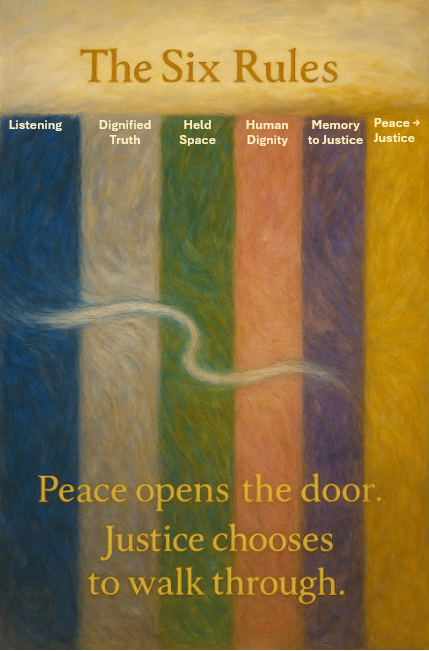
Dawn spread quietly across Grandfather’s house, brushing the windows with a pale, amber hush. Emil sat alone in the old study, where dust motes drifted like slow constellations above the desk. The ledger lay open before him. Beneath his fingertips, the worn grain of the wood held the warmth of memory — debates, laughter, arguments, silence. A place where thoughts had been allowed to ripen before being spoken.
The river outside moved in its unhurried way, carrying winter’s melt toward distant fields. Emil closed his eyes and listened: not to the water itself, but to its rhythm — forward, patient, unconcerned with who watched or doubted. Kyiv was not gone, he realized. It was flowing still, inside him.
The mural.
The slips.
The trembling voices that had learned, little by little, not to fear their own sound.
The world had many languages for anger. Entire dictionaries for strategy. Grammars for war. But peace — peace had almost no vocabulary at all. And without vocabulary, even the truest intention collapses into misunderstanding.
Maybe peace fails, Emil thought, not because people reject it, but because they don’t know how to speak it.
He dipped his pen into ink and began, not as a student echoing someone wiser, but as one who had seen, and touched, and wept, and understood.
The Grammar of Peace
Rule One: Listening is the first grammar of peace.
Before truth can be shared, someone must feel safe to speak — and someone must be willing to hear. Words without listening are noise; listening without judgment is meaning.
Rule Two: Name reality without erasing another’s pain.
Peace does not require agreement, only honesty that does not trample dignity. To understand is not to yield; to acknowledge is not to lose.
Rule Three: Hold space between differences.
The world fears the “in-between” and rushes to close it through force or certainty. But the space between perspectives is where bridges stand. Distance, when held with respect, becomes connection.
Rule Four: Restore the person before the problem.
A policy cannot heal what humiliation breaks. Peace begins where humanity is returned — where a face weighs more than a flag, and a child more than a claim.
Rule Five: Let memory serve justice, not vengeance.
To remember is necessary; to weaponize memory is ruin. Justice protects the future; vengeance devours it.
Rule Six: Peace opens the door; justice walks through it.
Peace is not the harvest — it is the season that makes harvest possible. Peace creates conditions and opportunities, but it cannot force their fruit. Justice requires human will, steady work, and moral clarity. Peace simply grants the space in which justice might grow. Justice is never given; it is cultivated — or it dies in the field of unrealized opportunity.
Emil lowered the pen.
The room was still. The river continued its steady pulse below the hill. He let silence settle, not as absence, but as affirmation — the kind that lets thoughts land softly without shattering.
These rules were not answers. They were beginnings. But beginnings, Emil had learned, are not small things. They are the only things that ever change the world.
He breathed in the quiet of the study, feeling — for the first time — that peace was not something fragile to admire, but something learnable. A literacy. A discipline. A way of speaking that guarded the humanity of the other while preserving one’s own.
Ledger Entry — The Grammar of Peace
Date: May 10, 2026
Symptom: Dialogue collapsing into slogans; memory weaponized; identity hardened into camps.
Disease — The Four Absences (Global Pattern):
Absence 1 (Exclusion): Belonging reduced to borders and blocs.
Absence 2 (Vengeance): History recited as threat; future mortgaged to grievance.
Absence 3 (Dehumanization): People reduced to “issues,” “zones,” “assets,” or “risks.”
Absence 4 (Unheard Cry): Citizens’ grief drowned beneath national posture.
Investigator’s Response:
Define a shared grammar: listening, dignified naming, protected space, human-first repair, memory disciplined toward justice, and opportunity as condition — not conclusion.
Outcome (Emerging):
First principles articulated; lexicon forming.
Note:
Peace must be taught as a language — practiced, corrected, spoken, and lived — or it will remain forever untranslated.

